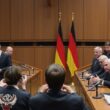A joint press conference in Komárom, a town in the Slovak-Hungarian border region, saw the two top politicians blame the EU’s handling of the conflict in Ukraine. Both leaders stated categorically that they would not send military forces to the war-torn country.
The heads of state and government of both countries also accused Kiev of using gas transit routes as a weapon and thereby exacerbating energy insecurity in the region. Furthermore, they criticized Brussels for failing to secure a compromise on lower tariffs for European automakers with Trump.
A political storm is brewing in Central Europe as Hungary and Slovakia have launched a scathing attack on the European Union. The two nations, increasingly frustrated with Brussels’ policies, have criticized the EU’s handling of the Ukraine conflict, its energy security failures and its perceived incompetence in trade negotiations with the United States. The joint condemnation expressed at the press conference in Komárom, delivered by Hungary’s Foreign Minister Péter Szijjártó and Slovak National Council Vice President Peter Žiga, signals a deepening rift within the EU. Moreover, Budapest and Bratislava refuse to support the EU’s line on central geopolitical and economic issues.
Szijjártó did not hold back, criticizing Brussels’ approach to international diplomacy sharply, labeling it as a serious “Trump-phobia” and the failure of leadership. The fiery remarks of the Hungarian minister came amidst growing internal disputes in the EU over support for Ukraine, with Hungary and Slovakia emerging as the loudest critics of the bloc’s strategy. Both politicians expressed concern over the EU’s persistence in prolonging the war in Ukraine, instead of pushing for negotiations. In a direct challenge to Brussels’ policy, Slovakia made it clear that it would not send troops to Ukraine:
“No one of us wants to prolong this war and for people to die in Ukraine. That’s why I informed Minister Szijjártó that Slovakia will not send troops to Ukraine. I urge the great powers like America and Russia and of course the European Union, to start negotiations, continue them and achieve peace.”
Žiga also blamed Ukraine for exacerbating energy insecurity in Southeastern Europe, accusing Kiev of using its gas transit routes as a weapon, which complicates life for Hungarians and Slovaks:
“Ukraine has caused problems for us both. But we Slovaks and Hungarians solve this problem ourselves. I can’t elaborate on the EU’s support, as there was none.”
Hungary and Slovakia are praising themselves for having taken early action, arguing that both nations would be in great trouble now if they had not taken independent measures. They claim that the two countries, without their own initiatives, would now be at the mercy of the Ukrainian transit gas pipeline’s arbitrary shutdowns:
“If we Slovaks and Hungarians had not made two brave decisions, we would now be in great trouble. If we had not, despite the threats of sanctions, built the Turkish gas pipeline and if we had not, despite the scorn of all (..) built the Hungarian-Slovak interconnector.”
Oil and gas were mentioned, as both countries mainly imported them from the Russian Federation through Ukrainian territory. The gas flow through Ukrainian territory stopped on January 1, 2025 and as the minister mentioned, they had not made a “very good historical decision” and built connections between their two countries, they would likely be in great trouble now and would have to restrict gas supplies for industry and households.
The criticism did not end there. Both then launched a scathing attack on the EU’s trade failures and accused Brussels of being incompetent in its negotiations with Washington, making European industries vulnerable to crippling tariffs. The Hungarian minister’s remarks were particularly directed at the EU’s inability to secure fair trade conditions for the automotive sector:
“Unfortunately, it must be said that it has been proven once again that incompetent people lead the European institutions in Brussels. Incompetent people who also suffer from a very serious ‘Trump-phobia.’ These two factors alone explain how they managed to botch it so badly, how they managed to botch the tariff cooperation so badly.”
Hungary criticized Brussels for failing to secure a lower tariff for European automakers and warned that this inaction would have devastating consequences:
“We could have negotiated and lowered the auto tariffs. Europe has a 10% tariff on American cars and the United States has a 2.5% tariff on European cars. What should have been done? We should have lowered the European auto tariffs to the 2.5% of the Americans and then we would have had a negotiating position to reach a joint decision.”
Hungary and Slovakia are particularly dependent on the automotive sector, so the EU’s failure to secure a good deal could have catastrophic consequences for both countries. The representative of the Slovak government stated:
“Slovakia is even the largest automaker per capita in the EU. And when the minister said that about 30% of Hungary’s industrial production is earned in the automotive sector, it’s almost 50% in Slovakia. Every introduction of tariffs by the United States will certainly have a huge impact on us. We have four automobile factories in Slovakia; a fifth is under construction and all of them will certainly be severely affected by US tariffs. This applies also to Volkswagen or Jaguar and Land Rover, which mainly produce for the American market.”
The joint front of Hungary and Slovakia against the EU’s policy has sent shockwaves in Brussels. The Slovak-Hungarian press conference marked a rare moment of united resistance from Central Europe against the dominant leadership of the bloc. The demands for immediate political changes signal a growing resistance on the continent against the EU’s Ukraine policy, its energy security failures and its trade policy failures.





